|
|
|
Sort Order |
|
|
|
Items / Page
|
|
|
|
|
|
|
| Srl | Item |
| 1 |
ID:
134136
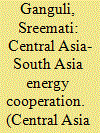

|
|
|
|
|
| Publication |
2014.
|
| Summary/Abstract |
This article focuses on India's energy security demands, as well as the energy security scenario of its immediate neighbors, mainly Pakistan and Afghanistan, and of its strategic neighborhood, i.e. the Central Asian countries. It attempts to concentrate on the factor of energy interdependence among these countries and argues that the possibility of an interregional energy cooperation mechanism is essential for energy security, and ultimately, stability in the wider region. A concept of interregional cooperation based on interdependence is vital for security in the broad sense of the term. These two neighboring regions do enjoy energy interdependence. The wider region has all three ingredients of the energy supply chain-the Central Asian countries as producers, Afghanistan and Pakistan as both transit and market states, and India as the market to make this cooperation feasible. But there has scarcely been any serious effort to put this energy chain into a meaningful dependency variable. For both regions, the other always seems too distant, either as a source or as a market. The continuing insecurity in Afghanistan and bilateral distrust between India and Pakistan are two of the major factors that always put energy relations between Central and South Asia on the backburner. But future prospects may not be so bleak, since the changing security scenario in Afghanistan calls for greater regional economic cooperation, which will be beneficial for Afghan economic reconstruction. More important, it will make the regional states shareholders not only in the Afghan reconstruction process, but also in ensuring greater interregional cooperative mechanisms as well. It is widely believed that energy as a product is a factor of geopolitical and geo-economic conflicts the world over, and there is also plenty of supporting evidence. This article, on the other hand, focuses on the potential of using energy as a vector of alliance in the regional and interregional context.
|
|
|
|
|
|
|
|
|
|
|
|
|
|
|
|
| 2 |
ID:
150529


|
|
|
|
|
| Summary/Abstract |
The EU and Russia exist in a complex and, at times, seemingly paradoxical and contradictory relationship. On the one hand, the two sides remain rhetorically committed towards a close and developing strategic partnership. On the other, the EU-Russia political relationship is currently at its lowest ebb since the end of the Cold War due to the crisis in Ukraine. A mixture of politics, economics and geography provide an impetus for the development of mutually beneficial relations and, at the same time, obstacles to the achievement of such a positive partnership.
|
|
|
|
|
|
|
|
|
|
|
|
|
|
|
|
| 3 |
ID:
086722
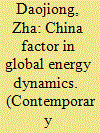

|
|
|
|
|
| Publication |
2009.
|
| Summary/Abstract |
The China factor is arguably the most important element in the anxieties of the past decade over energy and energy induced geopolitical changes around the world. It is, however, highly difficult of this issue, prevalent though they are in the mass media, diplomats venues, and even academic circles.
|
|
|
|
|
|
|
|
|
|
|
|
|
|
|
|
| 4 |
ID:
091427
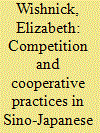

|
|
|
|
|
| Publication |
2009.
|
| Summary/Abstract |
This article reexamines the conventional wisdom that characterizes Sino-Japanese energy relations as predominantly competitive, but views Sino-Japanese environmental relations as essentially cooperative. Using sociological theories of risk, it is argued that Sino-Japanese cooperation is more likely in both the energy and environmental areas when common risks are perceived and relative gains are minimized. Despite their many conflicting strategic, political, and economic interests, as energy importers who are vulnerable to supply interruptions in the Middle East and competitors for global energy supplies, China and Japan share common risks to their energy security. Consequently, there actually may be increasing opportunities for China and Japan to address their common concerns through bilateral and multilateral cooperative practices, such as common positions on pricing or energy conservation initiatives. Although one would expect China and Japan to highlight their mutual interests in tackling environmental problems such as air pollution, in fact relative gains often impede cooperation. Japan increasingly views China as an economic competitor and is reducing environmental aid, while China continues to set a priority on economic growth, which sets limits on the use of costlier Japanese green technologies. By examining a selection of scholarly articles, reports and newspaper articles by Chinese and Japanese analysts, as well as material from interviews in Beijing and Tokyo in May-June 2007, the paper shows how environmental and energy issues in Sino-Japanese relations may be framed as threats, requiring counter-measures, or common risks, which can be addressed through cooperative practices. Lastly, the paper discusses the possibility of the development of an energy security 'risk community' as cooperative practices develop between China and Japan. Nonetheless, conflicting political interests, strategies, and self-images, accentuating relative gains, may provide obstacles to their cooperation in both energy security and environmental protection.
|
|
|
|
|
|
|
|
|
|
|
|
|
|
|
|
| 5 |
ID:
167128
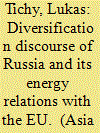

|
|
|
|
|
| Summary/Abstract |
The article explores the energy security relations between the Russian Federation and the European Union. The focus, however, is not on the technical and institutional aspects of the relationship, but rather on the discursive approach that determines the prevailing interpretations of the relationship by the two parties. The aim of this article is to analyze the content and basic themes of the Russian diversification discourse on energy relations with the European Union in 2004–2018. At the theoretical level, the article is based on critical constructivism, which, in relation to the discourse, and security as the main concepts, reflects a number of pieces of fundamental knowledge. At the methodological level, the article is based on thematic analysis. In the article, it is the main method of data analysis through which we examine the content of the Russian diversification discourse on the energy relations.
|
|
|
|
|
|
|
|
|
|
|
|
|
|
|
|
| 6 |
ID:
150538
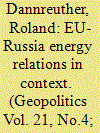

|
|
|
| 7 |
ID:
161562
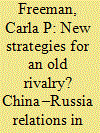

|
|
|
|
|
| Summary/Abstract |
China and Russia both have interests in bordering Central Asia. China's thirst for energy has seen its footprint expand rapidly in the region relative to that of Russia, Central Asia's historical hegemon. With the two powerful neighbors’ history of competition and conflict, the shift in relative influence between them risks a resurgence of bilateral rivalry. Referencing the scholarly literature on strategic rivalry, this article examines how energy relations have helped shaped the trajectory of China-Russian relations in Central Asia, particularly after the shock that came with the collapse of oil and gas prices in 2008–2009.
|
|
|
|
|
|
|
|
|
|
|
|
|
|
|
|
| 8 |
ID:
115895
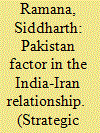

|
|
|
|
|
| Publication |
2012.
|
| Summary/Abstract |
India's relationship with Iran has been uneven owing to external factors. This article traces the role of the Pakistan factor in this relationship, wherein the religious identity of a fellow Islamic nation, the strategic outlook towards Afghanistan, and energy relations between the three countries are discussed. The article outlines the Pakistani primacy in the India-Iran strategic relationship and showcases how Afghanistan is the glue for India-Iran relations despite the breaks in their continuing relationship. The article concludes by providing an overview of this unique triangular relationship, assessing the wider interests of the parties involved.
|
|
|
|
|
|
|
|
|
|
|
|
|
|
|
|
| 9 |
ID:
106740
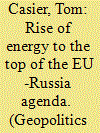

|
|
|
|
|
| Publication |
2011.
|
| Summary/Abstract |
Over the last decade we have witnessed an increasing politicisation of the energy discourse. Today energy relations of the EU are framed in terms of excessive dependence on Russia, qualifying the latter as a security threat. This article puts forward four criteria to define energy relations in security terms: supply vulnerability of the EU, the absence of Russian demand dependence, the dominance of energy over other capabilities, the willingness to link energy to foreign policy objectives. Little support is found to define the dependence on the import of Russian energy resources as a security issue. An alternative explanation is given, attributing growing energy concerns to shifting identities and perceptions in EU-Russia relations, which have contributed to understanding energy relations in competitive and geopolitical terms. Russia has developed a more assertive energy diplomacy, while in the EU sensitivity over energy dependence has grown as a result of changes on the global energy market and of the 2004 enlargement.
|
|
|
|
|
|
|
|
|
|
|
|
|
|
|
|
| 10 |
ID:
106470
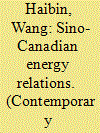

|
|
|
| 11 |
ID:
121182
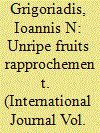

|
|
|
|
|
|
|
|